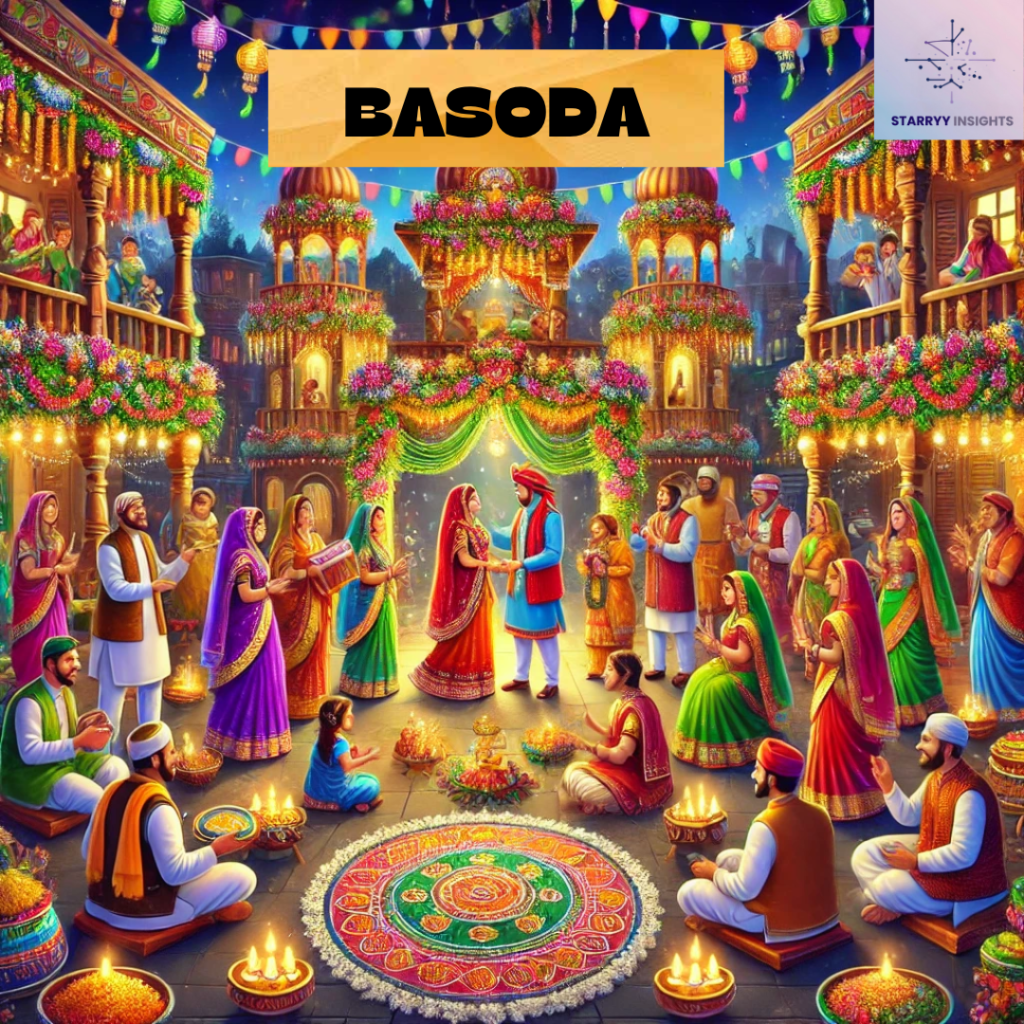What is Basoda?
Basoda, also known as Sheetala Ashtami, is a revered Hindu festival that primarily takes place in North India. The festival is dedicated to Goddess Sheetala, who is believed to provide protection from infectious diseases, particularly those that spread in the summer months, like smallpox, chickenpox, and measles. Basoda is celebrated with devotion, and its observance plays a vital role in promoting health, wellness, and community spirit.

When is Basoda in 2025?
In 2025, Basoda will be celebrated on Saturday, March 22. The festival follows Sheetala Saptami (March 21, 2025), with the rituals extending into Basoda the next day.
Significance of Basoda
Basoda is a festival that emphasizes cleanliness, health, and wellness. The main significance lies in the worship of Goddess Sheetala, who is believed to be a divine protector from contagious diseases that typically spread during the hot summer months. In many parts of India, smallpox and other infections were rampant before the advent of vaccines, and Goddess Sheetala is worshipped to keep these afflictions at bay. The festival, therefore, holds deep symbolic meaning as a way of ensuring the health of the family and community.
“Embrace the powerful energy of Bharani Nakshatra to unlock new opportunities and personal growth. Tap into the nurturing and transformative influence of this star for a prosperous journey.”
Rituals and Observances
1. Pre-Cooked Food Ritual
One of the most distinctive rituals associated with Basoda is the consumption of pre-cooked food. This practice is rooted in the belief that Goddess Sheetala, who is associated with coolness and health, blesses devotees when they consume food prepared a day earlier.
- Sheetala Saptami (March 21, 2025): On this day, families typically prepare a variety of food items, including sweets like puris, and savory dishes. The food is allowed to cool naturally.
- Basoda (March 22, 2025): On this occasion, fresh cooking is strictly avoided. Instead, the pre-cooked food is consumed as a sacred offering to Goddess Sheetala, and it is believed that by doing so, devotees receive her blessings for good health and protection from diseases.
2. Visiting Temples
Devotees wake up early on Basoda and take a ceremonial bath to purify themselves before heading to the temples dedicated to Goddess Sheetala.
- The puja (worship) involves offering the pre-cooked food to the goddess, praying for protection from illnesses, and performing the necessary rituals. This includes chanting mantras and reciting hymns that invoke the goddess’s blessings.
- Many temples also distribute prasadam (blessed food), and devotees gather to participate in the community worship.
3. Charity and Community Welfare
Charitable acts are an integral part of Basoda. As a means of seeking Goddess Sheetala’s blessings, people engage in acts of donating food, clothes, and money to the needy. This practice not only fosters community welfare but also enhances the spirit of giving during the festival. By helping the less fortunate, devotees believe they accumulate positive karma and gain divine blessings.
Culinary Traditions
Food plays a central role in Basoda, and the festival is known for its specific culinary traditions that revolve around pre-cooked, cool food. In addition to sweets and savory dishes, traditional recipes vary depending on the region. Some common items include:
- Puriyas (fried flatbreads) and Malpua (sweet pancakes) are made and left to cool overnight, to be consumed on the day of Basoda.
- Rabri (a rich, condensed milk dessert) is prepared in many households.
- Curd-based dishes: In some areas, curd and rice dishes are common for offering to the goddess.
The cooling of the food and avoiding fresh cooking symbolically represent the cooling effect of the goddess, who is believed to grant relief from heat-related diseases.
“Celebrate the divine grace of Bhishma Ekadashi by observing fasting and devotion. Join us in honoring the legendary warrior and gain strength, wisdom, and blessings for the year ahead.”
Cultural Variations
While the core meaning of the festival remains the same across regions, different states and communities have their unique ways of celebrating Basoda:
1. Rajasthan
In Rajasthan, Basoda is celebrated with a lot of enthusiasm. The festival involves grand fairs in some areas, where people gather to worship Goddess Sheetala. Many families prepare special foods like gulgule (sweet fried dough balls) and ker-sangri (a dish made from a local vegetable).
- The temples are beautifully decorated, and processions may take place in some regions. Devotees visit temples in large numbers to perform the ritual.
2. Gujarat
Known as Shitala Satam in Gujarat, the celebration is quite similar to that of Rajasthan. Devotees go to temples, and pre-cooked food is offered to Goddess Sheetala. The festival is widely celebrated across the state, with special prayers, community gatherings, and devotional music. It is also a time when families come together and spend quality time, emphasizing wellness and good health.
3. Uttar Pradesh and Haryana
In these northern states, the festival is also observed with great reverence. People prepare specific sweets and meals, and worship Goddess Sheetala with a focus on protecting the community from illnesses. Devotional songs and hymns dedicated to the goddess are sung, and food donations are made to temples and charitable institutions.
Basoda’s Impact on Health and Community
Basoda is not only about worship; it serves as a reminder of the importance of hygiene and health. The cooling effect of the food and the emphasis on cleanliness play a key role in the traditional belief that the goddess can protect families from diseases.
- By observing this festival, people remind themselves of the importance of preventing the spread of diseases and maintaining cleanliness, which was particularly crucial during the pre-vaccine era.
- The charitable donations made on this day highlight the sense of community and the importance of social responsibility. This communal aspect makes Basoda a festival of shared prosperity and wellness.
“Discover the magical connection between Pisces and Scorpio. Delve into the depth of this water sign relationship and explore how their emotional bond can create a powerful, transformative partnership.”
Conclusion
Basoda, or Sheetala Ashtami, is a celebration deeply rooted in health, cleanliness, and community. The festival’s rituals, centered around food, worship, and charity, foster a sense of divine protection from diseases, especially during the summer months. Whether through visiting temples, consuming pre-cooked food, or participating in charitable acts, devotees seek the blessings of Goddess Sheetala for their well-being and prosperity.
With its deep cultural significance, Basoda remains a time for family gatherings, spiritual reflection, and community welfare, transcending generations and geographical boundaries in India.
FAQS
1. What is Basoda Festival?
Answer: Basoda Festival is a vibrant celebration that honors the sacred bond of marriage, love, and family. It is a time for people to come together and express their love and respect for one another, celebrating unity and harmony in relationships. The festival is marked with rituals, music, dance, and a variety of traditional festivities.
2. When is Basoda Festival celebrated?
Answer: Basoda Festival is celebrated annually, typically during the months of September or October, depending on the lunar calendar. The exact date can vary each year, as it is based on astrological alignments.
3. What are the main customs and rituals associated with Basoda Festival?
Answer: The festival is marked by several rituals that symbolize love and togetherness, such as:
- Marriage-themed ceremonies: Symbolic weddings are conducted with blessings exchanged between couples or family members.
- Traditional prayers: Prayers are offered for the well-being and happiness of families, with a focus on unity and prosperity.
- Dance and music: Folk dances and traditional music are enjoyed by everyone, creating an atmosphere of joy and togetherness.
4. What is the significance of Basoda Festival?
Answer: The significance of Basoda Festival lies in honoring the strength and beauty of marital relationships and family bonds. It emphasizes love, commitment, and unity, while fostering a sense of community and togetherness. The festival also seeks blessings for long-lasting, happy marriages and strong family relationships.
5. Can single people participate in Basoda Festival?
Answer: Absolutely! While the festival highlights the importance of marriage and family, it is open to everyone, regardless of marital status. Singles can celebrate Basoda by participating in the joyful festivities, honoring relationships in all their forms, and seeking blessings for future love and companionship.
6. What types of food are served during Basoda Festival?
Answer: Basoda Festival is known for its lavish feasts, with a variety of traditional dishes. Expect to enjoy sweets, savory snacks, and special dishes prepared for the occasion, which may include local specialties and family recipes that have been passed down through generations.
7. How do people decorate for Basoda Festival?
Answer: Decorations are an important part of the Basoda Festival. Homes are adorned with vibrant colors, flowers, and traditional symbols of prosperity and love. Rangoli designs, colorful lights, and festive garlands are commonly seen, creating a warm and welcoming atmosphere for guests.
8. Is Basoda Festival only celebrated in India?
Answer: While Basoda Festival is most commonly celebrated in India, particularly in regions where traditional family values are strongly upheld, people from Indian communities around the world also celebrate it. The festival has transcended geographical boundaries, with celebrations taking place in many countries.



